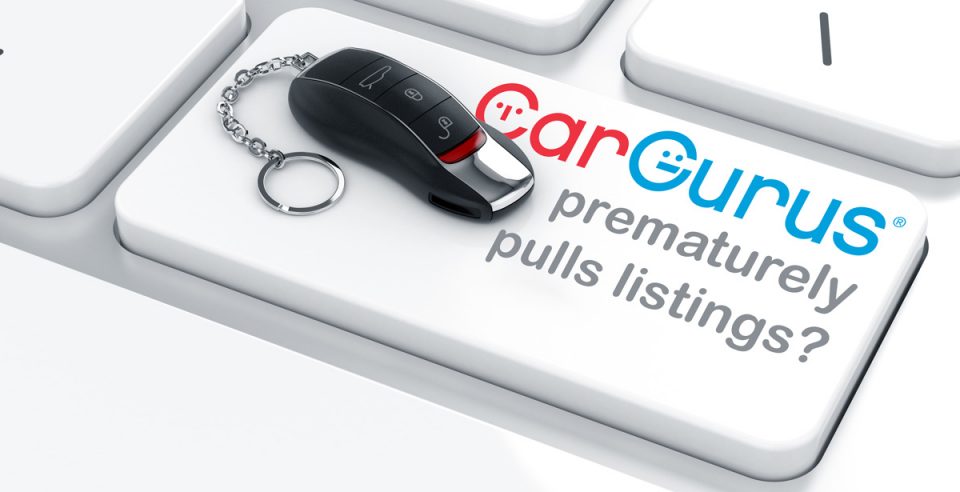Lead volume determines the time frame a listing stays up for
Call it machine-learning, artificial intelligence, whatever, but CarGurus has determined that once a car has had a predetermined amount of leads, it should have been sold. Perhaps it was, perhaps it wasn’t. Either way, they are pulling what they consider stale inventory off the shelf at their discretion. In other words, a vehicle that may have received (hypothetically) 20 leads has reached its limit, and will no longer appear in the search results page when a customer is looking for that particular vehicle. Despite that, there is no real way to objectively determine the true quality of those leads.
Dealers aren’t given notice, the listing just…goes away
Dealers are complaining that they can’t find sitting inventory on the CarGurus.com classified site they pay to advertise on, and have no idea how long that inventory has been removed from search. Truth be told, that inventory disappears from the search results, but stays in place on the dealer’s inventory CarGurus page. What irks dealers is that CarGurus has no idea whether or not that inventory has been sold, as there is no communication between CarGurus and themselves to confirm before the listing goes black.
Historically, leads generated on 3rd party classified sites tend to take 60 days to close on average. To gain some perspective here, email leads take 42 days, direct, organic, Facebook Marketplace, and paid traffic take 30 days to close on average. Call traffic is considered a high value, off-line lead second only to warm referrals, and foot traffic. These are just averages though, and there can be a number of reasons why some popular units sit longer than others.
Dealers really need to pay attention to the inventory that they list on a classified site because this practice may not be limited to CarGurus. In CarGurus defense, they are trying to maintain a positive user experience, and listing potentially phantom inventory that has already been sold is a huge credibility problem. I’ll explain in a moment.
The car I’m paying for to rot on my lot, I’m now paying to rot on CarGurus.com…huh?
Perhaps it’s in the fine print that listings can be pulled from search at CarGurus leisure. Still, how does one rate the veracity of a lead if they are to be limited? If certain inventory is stoking a lot of calls or lead form fills, it may be on the verge of closing and then suddenly…CarGurus zaps it without warning. The “without warning” part is the issue. I think we can all agree that some leads are better than others. I also think we can all agree that when you’re advertising on a site that also carries look-alike inventory from competitors, the quality of a lead can be diluted. CarGurus is not taking into account the demographic of the customer, their credit profile, or otherwise. The input we’re getting is that the leads are basically people with not enough for a down payment or they have really bad credit. CarGurus isn’t the least expensive classified out there. Most dealers pay good money to keep their inventory listed for a reason, usually because it isn’t sold!
Dealership bait and switch tactics, laziness to blame for flawed CarGurus policy?
The challenge many car dealers have is in managing their own inventory. Failure to pull down sold inventory may be the ultimate reason for the CarGurus policy to vaporize certain listings out of search. It may be as innocuous as dealers having inventory management issues or just being too busy or possibly too lazy to pull units down after they’ve been sold.
In CarGurus defense, they have experienced negative consumer feedback complaining of car listings not being updated. CarGurus is also weary of bait and switch tactics that dealerships use to lure in buyers. It hurts their reputation as a classified site. Experience combined with some data crunching probably suggests that they’re better safe than sorry by lifting inventory out of search that meets a certain set of criteria shared by vehicles that have actually sold.
Maybe they just need to improve the software that’s processing the inventory data to get more accurate real time results instead of clipping the dealership’s cars? Most inventory companies take 24-48 hours to update the listings, depending on how many feed providers are involved.
The Solution is pretty simple
We’re sitting on a list of a dozen car dealers that can’t find their unsold inventory on CarGurus.com. Unless it suddenly became a free classified site I’d say this is an issue that needs to be addressed quickly. Consequently, dealerships need to stay on top of their inventory at all times with all vendors. Dealers use a variety of inventory management solutions that should prevent this from happening but not all do. In lieu of automation, the Internet director or manager needs to be proactive enough to know what’s up and what’s down. Have a list of vendors your inventory is going to, be proactive about reaching out to those companies when you have an inventory provider switch, and most importantly, ensure the listings are accurate. Now that you’ve read this, it’s best to follow the old Ronald Reagan axiom that he applied to the Soviet Union…“Trust but verify.”


